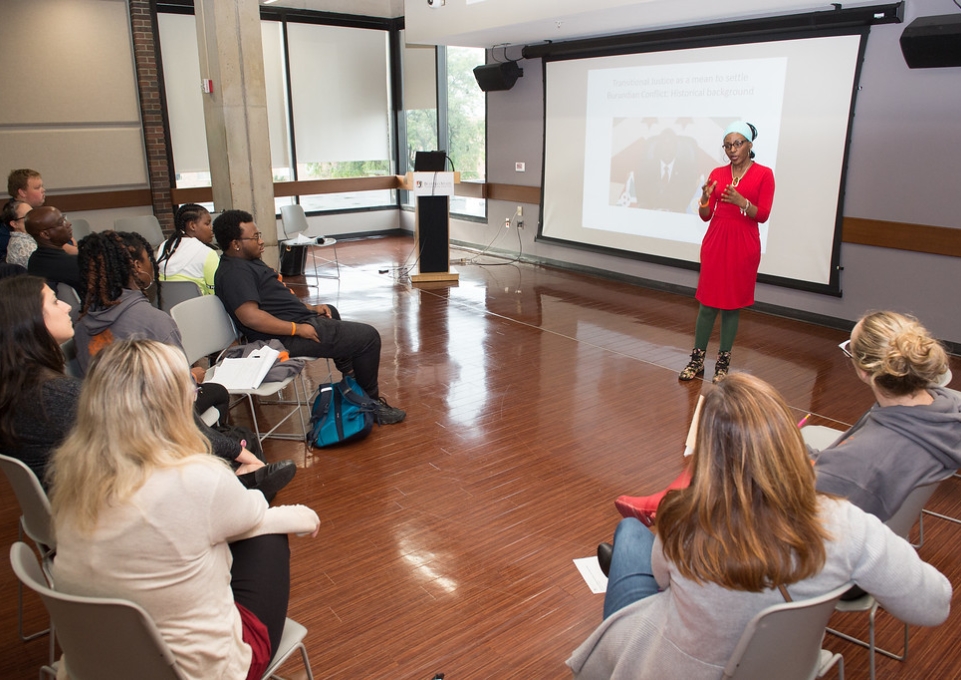
This year's Social Justice Festival at Buffalo State University will engage diverse communities in teachable ways to respond rather than react. The theme directly reflects the core of the Anne Frank Project's mission: Ideas + Action = Justice.
This two-day celebration taking place Wednesday, October 4, and Thursday, October 5, will feature stories from multiple disciplines that build community, manage conflict, and explore identity. It is an academic ritual at Buffalo State that includes workshops, performances, and art exhibits that challenge, teach, and explore diverse social and personal justice topics.
One of the featured speakers at the 15th annual Social Justice Festival is Autumn Rose Williams, who will address Indigenous awareness, self-love, and empowerment.
If you want to get a feel for what to expect and what you can take from the festival, here are three perspectives from a student, an administrator, and a faculty member:
. . .
Taliyah Oaks, Buffalo State University senior, majoring in media production:
"I had never heard of the Social Justice Festival until I took an acting course with Drew Kahn. My first event was seeing a writer, Nic Stone, who wrote 'Dear Martin.'
"She told her life story. She didn't know what she wanted to do. She pointed out how she was able to express herself through writing. Her message was, 'Go for what you want to do and always follow your instincts.'
"Our power is our story. We should be opening doors now and for future generations. It was inspiring to me to hear from someone who looked like me and was a female in that field. We're not boxed in. We can make an impact in the field of journalism."
. . .
Amitra A. Wall, Buffalo State University associate provost, who has regularly presented at the Social Justice Festival:
"The Social Justice Festival utilizes our great resources here at Buffalo State. It highlights how we can talk about and discuss social justice in a positive way. The festival is a typical conference on steroids. Participants are engaged beyond the learning of new theories and listening to presentations. The festival tugs at the mind and heart so that our ways of thinking can be examined.
"Every year I anticipate seeing the buzz of festival activities. The energy around the tables in the Plaza and Student Union, student volunteers in AFP tees and bracelets, and the ah-ha moments after participants apply a nugget of truth; it is invigorating. I encourage everyone to get involved. It is magical to see students, faculty, staff, and the community work together for a common goal.
"The Anne Frank Project is recognized and felt beyond Buffalo State, the West Side, the city of Buffalo, and New York state. Nationally and internationally, individuals connect through the project. At the conference last year, I met a woman who was from California who was visiting Rochester at the time. She attended the festival because wanted to learn more about Rwanda and the activities so that she can apply that to her job where she engages East African communities."
. . .
Andrew Hashey, Buffalo State University associate professor and chair of the Exceptional Education Department:
"Participating in the festival has become a rewarding yearly ritual for me. I look forward to the diverse and engaging programming as a source of inspiration in both my professional and personal life. My role on campus is a faculty member in the Exceptional Education Department, where we help prepare teachers to work with students who experience education differently than many of their peers. These different experiences may be the result of having an educational disability, language differences, or other factors that present barriers to learning and development. As a high school teacher, my students were always engaged when I could help them see their role in creating a more just world, so I have always seen that as a hallmark of good teaching—helping kids connect ideas in schools to the real world. Most kids intuitively understand that value, and I think most adults do, too. AFP just makes it a priority to surface these important conversations and ideas among the adults in our campus community.
"When my world as a teacher educator is anchored in, or responsive to, issues of social justice, I’m hopeful that this focus will find its way into my students’ future classrooms, as it did mine. I’m also acutely aware that educators’ work, like any profession, is situated within broader communities. We know strong communities are ones founded on relationships, and where members seek to understand one another. I consider the Social Justice Festival to be a key part of that nurturing of our campus community. When I encounter new ideas through AFP, my understanding of myself and others deepens, my perspectives often become more nuanced, and I meet people—students, staff, faculty, community members—that make the campus come alive to me. It’s a gift.
"Each of the programs I have attended over the years—from discipline-specific showcases, to panel presentations on global issues, and workshops featuring distinguished speakers—has been a breath of fresh air. As a result of attending the Social Justice Festival in my first years on campus, I was inspired to present on issues that are not in the scope of my typical teaching or scholarship activities, but which I feel can positively contribute to our 'village' and beyond. It has also led me to become more involved in the ongoing work of AFP in initiatives like Sophia’s Legacy project and the AFP Advisory and Engagement Committee, which are important, and a lot of fun.
Overall, the relevance of the Social Justice Festival programming stimulates the mind, touches the heart, and helps participants not only think about social justice issues, but also seed the actions that we can take as individuals to strengthen ourselves and our communities. I’m always game for that."



